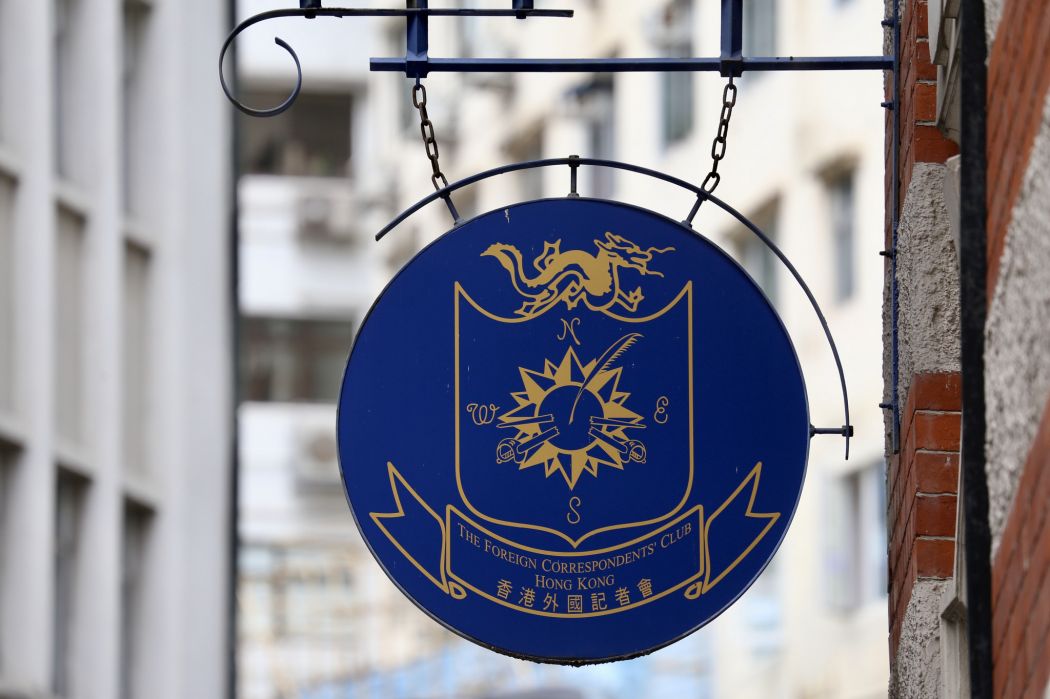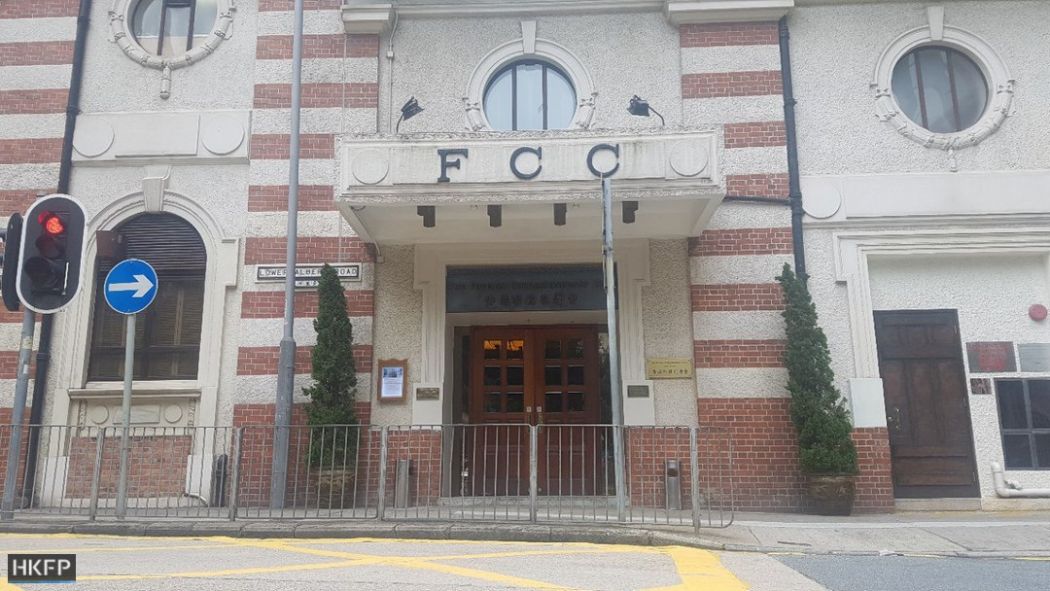The Foreign Correspondents’ Club (FCC) is standing its ground on a new anti-harassment policy after a group of members launched a website and petition to “preserve free speech” at the press club.
The policy, sent to members last November, defines harassment as conduct that could cause offence or intimidation “on the basis of appearance, gender, race, ethnicity, religious beliefs, sexual orientation, disability, physical size or weight, age, marital/family status, nationality, language, ancestry or place of origin.” It encourages members to approach alleged harassers or confidentially report bad behaviour to a manager or board member.

However, an anonymous campaign group, which claims to have 120 supporters, has pushed back against the policy. On a website promoting on beermats, the group of members say that the club should not define the boundaries of speech with broad policies which could be weaponised by members with ill-intent.
“You can also be reported simply for staring. Good rules for a dictatorship, not the FCC,” the website said, claiming that the policy contravened free speech provisions in Article 27 of the Basic Law.

According to the FCC, a disciplinary process may be activated if a complaint is officially made, which could result in warnings, or a suspension or expulsion from the private club.
The campaign website said it was not diminishing the issue of harassment, but says the policy was enacted without proper consultation: “We are against badly written rules which treat members like children and belong to a college campus ‘safe space’, not a media institution that has set the tone on free speech in Asia for 76 years.” As a solution, the website suggested an alcohol-free zone, support for members with alcohol-related issues, and recommended the club diversify its membership with more women.
It is unclear who is behind the campaign, but the “save-the-fcc.com” domain was privately registered on March 4. The site, which includes images of Gandhi, Bob Marley and the “Je Suis Charlie” campaign, has been hidden from search engines and contains no contact information. A message on its “About” page urged members not to share the site on social media, and said it would remain up until the club’s board suspended the policy or discussed it at a general meeting.

”In Full: The FCC’s anti-harassment policy – click to view“
The Foreign Correspondents’ Club of Hong Kong is committed to providing an environment in which employees, members and their guests are free from harassment and are treated with dignity and respect.
As stated in the By-Laws, 21(b), “Members are required at all times to conduct themselves with decorum and to consider the comfort and quiet enjoyment of other users of the premises.”
The Board takes complaints of harassment seriously, and any member found to be in breach of this policy is subject to disciplinary measures, up to and including termination of membership. Sexual harassment may also entail civil and criminal liabilities.
All complaints shall be investigated fairly and promptly in accordance with the Articles of Association and with respect for the confidentiality of those involved. Disciplinary action will be taken against anyone who interferes with the conduct of an investigation or retaliates against a complainant.
This policy aims to explain and prevent the types of unacceptable behaviour that could amount to harassment. It applies to all members of the Club and their guests, and all members are responsible for complying with this policy and discouraging behaviour that goes against it regardless of whether a complaint is made.
This policy does not impose any contractual obligations on the Club. It is subject to periodic review and updates.
Definition and Examples of Harassment
Harassment is defined as any unwelcome conduct, comment or display that is known or ought reasonably be known to offend, intimidate or humiliate the recipient on the basis of appearance, gender, race, ethnicity, religious beliefs, sexual orientation, disability, physical size or weight, age, marital/family status, nationality, language, ancestry or place of origin.
Harassment does not have to be intentional. It may occur between persons of the same sex or opposite sex, and a single incident may be sufficient to constitute harassment. It may include, but is not limited to:
- Sexual or physical assault, stalking and indecent exposure
- Inappropriate touching or brushing
- Sexually suggestive remarks
- Persistent unwelcome invitations or requests
- Sexual propositions; promises or threats in return for sexual favors
- Inappropriate comments about a person’s body, appearance or clothing
- Unwelcome questions or sharing of information regarding a person’s sexual activity or sexual orientation
- Displaying or distributing sexually explicit material
- Staring or leering or making suggestive or insulting sounds
- Jokes, taunts, gestures or innuendo concerning gender, race, ethnicity, sexual orientation, etc.
- The use of racial and ethnic slurs or derogatory sexual terms
- Bullying; verbal abuse/profanity
Procedures for Harassment Complaints
Any person who feels he or she is experiencing harassment can approach the alleged harasser about it directly and/or report it to a Board Member, the General Manager or the floor manager on duty. Formal written complaints can be filed using forms available from the Front Desk or Main Bar staff. All information related to a harassment complaint will be kept confidential. Information will only be disclosed to relevant persons on a need-to-know basis.
Complaints may be filed only by members on behalf of themselves or a guest. The respondent will be informed that a complaint has been made and by whom and will receive a copy of it. The Board will then determine whether to proceed with the disciplinary process as outlined in the Articles of Association.
Depending on the severity of the case, disciplinary action may include:
- A warning or letter of reprimand
- Verbal or written apology to the complainant
- Temporary suspension of membership
- Expulsion from the Club
If the allegations are criminal in nature, it is up to the complainant to file a police report.
The complaint handling procedure of the Club does not affect the complainant’s lodging complaints with the Equal Opportunities Commission, reporting to the police or filing a lawsuit in court.
FCC President Florence de Changy defended the policy in a notice to members on Friday. She said the rules were enacted in accordance with procedures following three harassment cases in 2017. The policy enabled a welcoming environment and the complaints process would not be changed, the notice said.
“All members are responsible and accountable for their own behaviour, and that means respecting other people’s boundaries. The FCC should be a harassment-free environment, and this policy provides a framework to achieve that,” de Changy said.
She added that free speech did not permit members to treat others in a demeaning way, but the board was open to criticism and further discussion.
‘Entitled men’
Ilaria Maria Sala – a member and former club president – first drew attention to the online campaign’s beer mats on Twitter, after they were scattered around the FCC bar. She told HKFP on Thursday that she knew of members who had been harassed, and said it was ludicrous that “entitled men” would feel the policy harmed free speech: “I have always loved the FCC but it is no secret that on occasion some members, especially if they have had a drink too many, behave as if being disrespectful and harassing women is good sport.”
So the @fcchk has decided to put in place an anti-harassment policy. Most women who have decided not to spend much time at the bar know it was needed. Some of the harassment-happy (male) members however decided this is bad because “free speech” and are putting these coasters out: pic.twitter.com/qxqjXBSyXB
— Ilaria Maria Sala (@IlariaMariaSala) April 4, 2019
“Other kinds of measures to stop this haven’t worked, so the policy has been put in place. One important element of the policy is to communicate to women, and others who may be victims of harassment, that the FCC doesn’t condone this, and encourages victims to come forward and denounce unacceptable behaviours,” she added.

Member and freelance journalist Erin Hale told HKFP that she was excited to hear about the policy as her friends previously had run-ins with men behaving inappropriately. Hale said she still felt the FCC was a safe space, though the pushback against the policy was not unexpected: “The issue seems to be largely generational – the people who are engaging in this behaviour are all clearly older members who seem deeply entitled to the FCC space and to behave like they are at home. They also seem to feel entitled to younger women’ attention.”
[THREAD] Let’s take a moment to unpack the new Save The FCC campaign. Are they saving Victor Mallet? Or the lease from CY Leung’s threats? Or some journalist from defamation? Nope! They want to https://t.co/6zXDkfeDSs from its new sexual harassment policy.
— Erin Hale (@erinhale) April 5, 2019
“Who wants to admit they are sexist…? It’s easier to wrap yourself in the flag of free speech than to think ‘Maybe I need to change from the way I behaved in the 1980s.’”
In an editorial in the club’s magazine in January, de Changy said that the policy was in line with efforts to improve the club’s diversity and gender balance: “It is essential that the FCC is a warm, friendly and pleasant place for all, to meet, work, network, relax and chill… I sincerely hope that this policy will send a strong signal of zero tolerance towards old-style and completely passe chauvinistic attitudes,” she wrote.
Founded in 1943, and located at a historic building in Central, the FCC attracts journalists, business people, diplomats and officials. It seeks to facilitate quality journalism, and promote press freedom across the region.
Last year, Jonathan Kaiman – the president of the Foreign Correspondents’ Club of China in Beijing – resigned after a former friend accused him of sexual misconduct.
The Hong Kong Free Press #PressForFreedom 2019 Funding Drive seeks to raise HK$1.2m to support our non-profit newsroom and dedicated team of multi-media, multi-lingual reporters. HKFP is backed by readers, run by journalists and is immune to political and commercial pressure. This year’s critical fundraiser will provide us with the essential funds to continue our work into next year.

